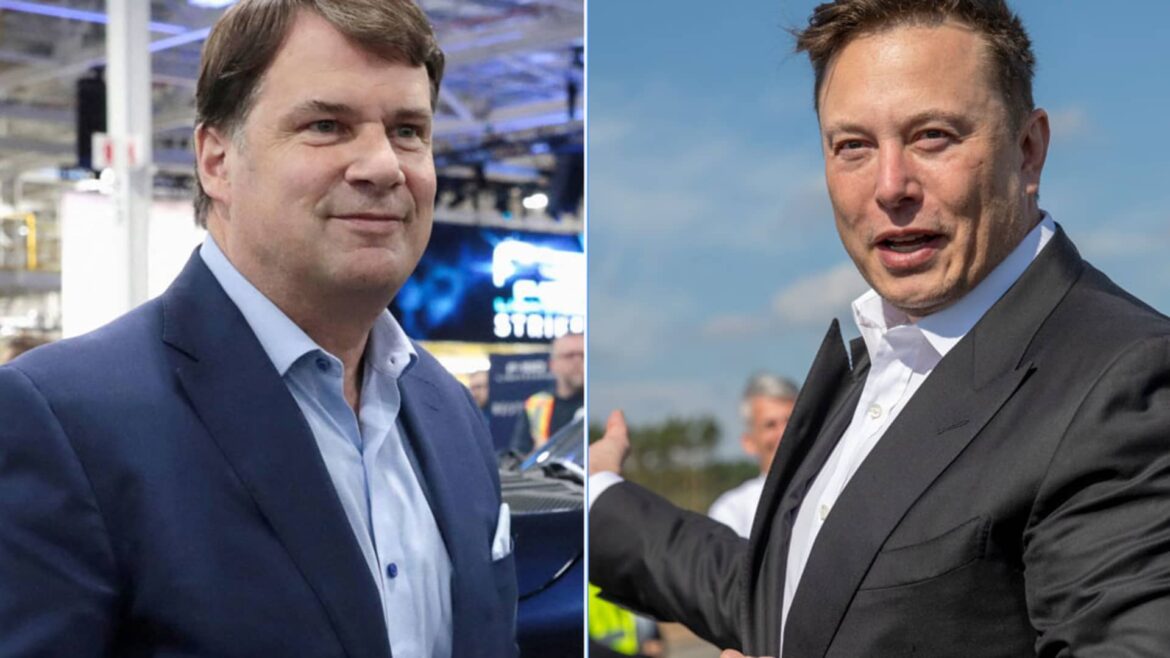Jim Farley and Elon Musk / Getty Images
DETROIT – Ford Motor will partner with Tesla on charging initiatives for its current and future electric vehicles in an unusual tie-up between the two rivals, CEOs of the automakers announced Thursday.
Under the agreement, current Ford owners will be granted access to more than 12,000 Tesla Superchargers across the U.S. and Canada, starting early next year, via the use of an adapter. And, Ford’s next-generation of EVs — expected by mid-decade — will include Tesla’s charging plug, allowing owners of Ford vehicles to charge at Tesla Superchargers without an adapter, making Ford among the first automakers to explicitly tie into the network.
The initiatives were announced by Ford CEO Jim Farley and Tesla CEO Elon Musk during a live, audio discussion on Twitter Spaces. They come as Ford attempts to ramp up production of its fully electric vehicles in an attempt to catch up to — or someday surpass — Tesla’s sales in the segment.
While Tesla still dominates the EV sector by far, Ford came in second in fully electric vehicle sales in the U.S. last year, notching sales of 61,575 electric vehicles.
Farley said the company is “totally committed” to a single U.S. charging protocol that includes the Tesla plug port, known as NACS. It’s unclear if Ford’s next-gen EVs will maintain the charging ports featured on current models, known as CCS. A Ford spokesman said the company has “this option available to us but have no news to share today.”
A separate Ford spokesman told CNBC that pricing for charging “will be competitive in the marketplace.” The companies will disclose further details closer to a launch date anticipated in 2024.
Tesla previously discussed opening its private network to other EVs. White House officials announced in February that Tesla committed to open up 7,500 of its charging stations by the end of 2024 to non-Tesla EV drivers. Previously the company’s chargers in the U.S. were mostly used by and made to be compatible with Tesla’s EVs.
In Tesla’s first-quarter shareholder deck, the company disclosed that it has roughly 45,000 Supercharger connectors worldwide at 4,947 Supercharger Stations. The company does not disclose chargers by country or revenue from the devices. It includes revenue from its Supercharging stations under a “services and other” segment.
The Twitter Spaces event between Farley and Musk Thursday marks the latest interaction between the two executives, who have a unique rivalry. They have each expressed admiration for the other, despite their companies competing directly.
Ford notably beat Tesla to the pickup segment beginning production of its F-150 Lightning, the electric version of its consistently popular trucks, in April 2022. Ford also heavily benchmarked the Tesla Model Y for its Mustang Mach-E crossover and followed Tesla in price cuts of the electric crossovers.
But Musk, who leads Tesla, SpaceX and Twitter, has repeatedly praised Ford as a historic American company, lauding its ability to avoid bankruptcy, unlike its crosstown rivals General Motors and Chrysler during the Great Recession.
Such flattery was prevalent during the Thursday call: “Working with Elon and his team, I’m really excited for our industry and for the Ford customers,” Farley said. Musk later reciprocated the feelings: “It’s an honor to be working with a great company like Ford,” he said.
Farley prodded Musk a bit, asking about the long-delayed new version of the company’s first vehicle, the Roadster. Musk teased a Roadster refresh back in the fall of 2017. He promised it would have a 620-mile range per charge and three motors, among other features.
Today, he reiterated Thursday, the new version of the Roadster is still not even completely designed.
Earlier Thursday, Farley commended Tesla on its charging network during a Morgan Stanley conference, saying that while Ford has created its own charging products for its commercial customers, automakers should consider collaborating on charging infrastructure for the general public.
“It seems totally ridiculous that we have an infrastructure problem, and we can’t even agree on what plug to use,” Farley said, noting that Tesla’s charging plug is different from that used by other automakers. “I think the first step is to work together in a way we haven’t, probably with the new EV brands and the traditional auto companies.”



